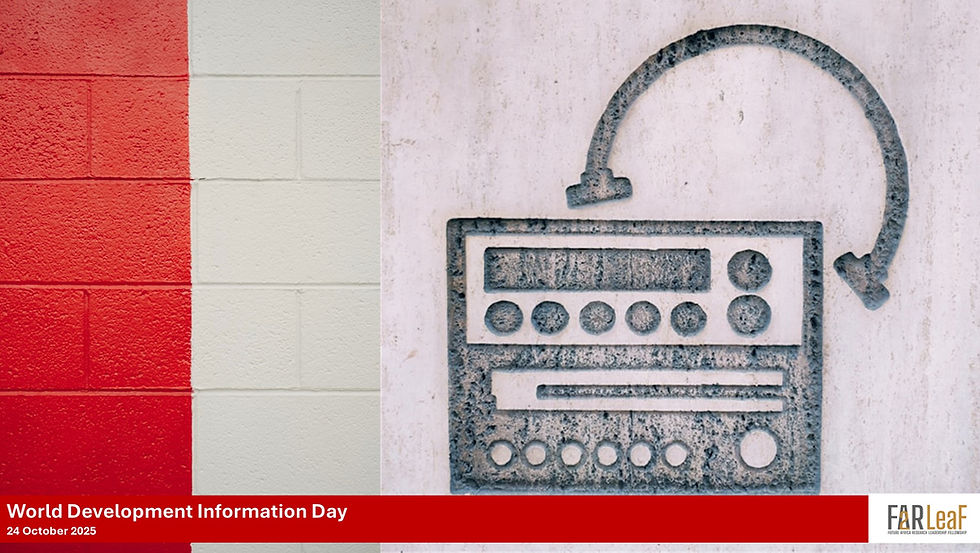Smart Avenues to Strong Communities
- Leti Kleyn
- Oct 24, 2025
- 3 min read

World Development Information Day, observed annually on 24 October, celebrates the transformative power of knowledge in driving sustainable development. Information is a tool for empowering communities, shaping policy, and creating equitable social and economic outcomes.
In Ghana, smallholder farmers are the backbone of the agricultural sector, making significant contributions to food security, rural livelihoods, and national development. Yet, many communities, particularly in the northern and forest-savannah transitional zones, face challenges accessing critical information on climate, markets, and agricultural innovations. Droughts, erratic rainfall, and extreme temperatures pose significant threats to livelihoods.
This day provides an opportunity to highlight how innovative knowledge systems, participatory communication, and local insights catalyse development, strengthen communities, and foster resilience across Ghana.
Community Radio: Local Knowledge for Real Impact
Community radio is a powerful driver of local development. By broadcasting content on climate forecasts, agricultural techniques, market trends, and policy updates, these platforms bring actionable knowledge directly to rural communities. Farmers interpret, experiment, and collectively adopt practices through discussions in cooperatives, women's groups, and informal networks. This participatory approach ensures that innovations, like drought-tolerant crops or soil moisture conservation, are co-created rather than imposed, fostering ownership, trust, and long-term adoption. It also strengthens community cohesion by transforming information into practical, shared solutions, which are central to national development strategies.
Governments and development partners should invest in community radio infrastructure and support the production of locally tailored content on agriculture, nutrition, climate adaptation, and socio-economic development.
Linking Agriculture to Empowerment
In northern Ghana, diets are often dominated by a few staple foods, and nutrition is closely tied to food security. Community radio bridges the gap by guiding listeners on nutrient-rich crop cultivation, promoting dietary diversity, and teaching cooking methods that preserve vitamins and minerals, thereby supporting a healthier lifestyle. Social learning networks enable households to exchange recipes, demonstrate techniques, and collectively adopt nutrition-sensitive practices. Equity and inclusivity are central to strong communities, and participatory radio programs provide women, youth, and other marginalised groups with a platform to voice concerns, share solutions, and influence local planning. Inclusive approaches ensure that interventions benefit all community members, enhancing social cohesion and adaptive capacity.
Integrating Indigenous and Scientific Knowledge
Traditional practices such as ancestral calendars, soil conservation techniques, and crop rotations reflect a deep understanding of local ecosystems. Communities can achieve higher yields and ecological sustainability when combined with climate-smart strategies, such as water-efficient irrigation, mulching, and early pest warnings. Community radio is a bridge, translating scientific recommendations into practical, culturally relevant guidance that complements local knowledge. Implementing National agricultural and climate policies that recognise and integrate indigenous knowledge alongside scientific innovations promotes culturally appropriate and sustainable development practices.
Multi-Stakeholder Collaboration: Scaling Impact
Sustained development requires coordination among governments, NGOs, research institutions, and community organisations. In Ghana, programs that combine radio broadcasting with farmer field schools, digital messaging, and local workshops ensure knowledge reaches communities in multiple ways. Aligning national policies with local initiatives strengthens food security and nutrition while building capacity to respond to climate variability and economic shocks. Governments and development partners should promote multi-stakeholder collaboration, aligning national frameworks with community-level actions to maximise impact.
Technology: Expanding Knowledge Reach
Digital tools, including mobile phones, social media, and online platforms, complement traditional radio by enhancing access to timely information. SMS alerts provide real-time weather updates, while online platforms offer market prices and extension resources. Media literacy, participatory engagement, and social learning fully realise technology's potential, allowing communities to critically evaluate, adapt, and share knowledge. Governments and development partners should invest in Information Communication Technology (ICT) infrastructure and digital literacy programs to expand the reach and effectiveness of development information systems.
Conclusion
Strong communities emerge when knowledge is accessible, actionable, and inclusive, creating resilient systems that respond to environmental, social, and economic challenges. Governments, NGOs, and international partners must invest in community-driven initiatives, inclusive learning platforms, and ICT infrastructure to ensure knowledge catalyses sustainable development nationwide. Smart knowledge leads to strong communities, communities capable of driving Ghana toward a resilient, equitable, and sustainable future.
Dr Enoch Kwame Tham-Agyekum








